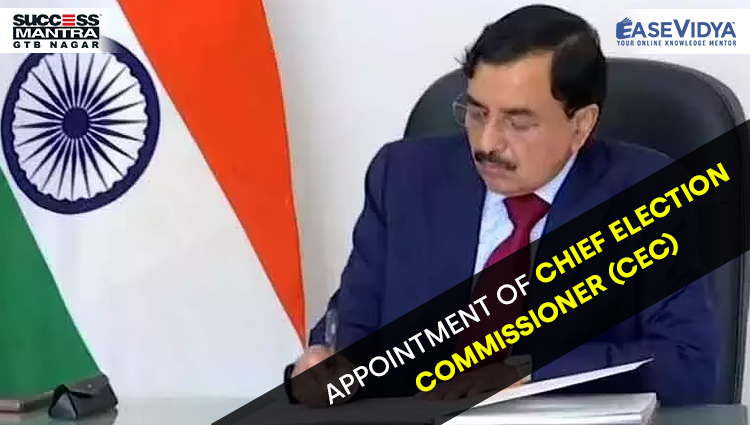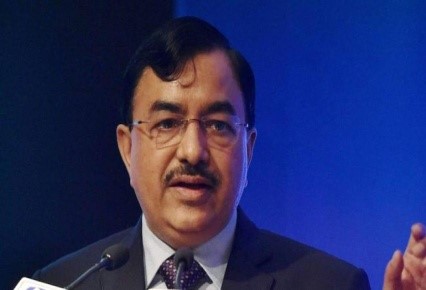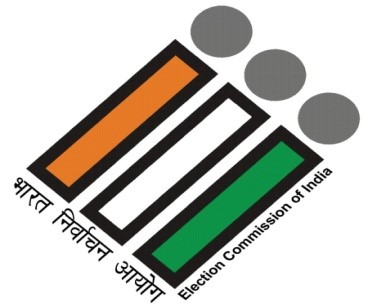
APPOINTMENT OF CHIEF ELECTION COMMISSIONER
APPOINTMENT OF CHIEF ELECTION COMMISSIONER (CEC)

Recently, the President appointed Election Commissioner Sushil Chandra as the Chief Election Commissioner (CEC). He replaces Sunil Arora who has retired.
About the Election Commission of India: The Election Commission of India (ECI) is an autonomous constitutional authority responsible for administering Union and State election processes in India. It was established in accordance with the Constitution on 25th January 1950 (celebrated as national voters' day). The secretariat of the commission is located in New Delhi. The body administers elections to the Lok Sabha, Rajya Sabha, and State Legislative Assemblies in India, and the offices of the President and Vice President in the country. It is not concerned with the elections to panchayats and municipalities in the states. For this, the Constitution of India provides for a separate State Election Commission.
RELATED CONSTITUTIONAL PROVISIONS
Part XV (Article 324-329) of the Indian Constitution: It deals with elections, and establishes a commission for these matters.
- Article 324: Superintendence, direction and control of elections to be vested in an Election Commission.
- Article 325: No person to be ineligible for inclusion in, or to claim to be included in a special, electoral roll on grounds of religion, race, caste or sex.
- Article 326: Elections to the House of the People and to the Legislative Assemblies of States to be on the basis of adult suffrage.
- Article 327: Power of Parliament to make provision with respect to elections to Legislatures.
- Article 328: Power of Legislature of a State to make provision with respect to elections to such Legislature.
- Article 329: Bar to interference by courts in electoral matters.
STRUCTURE OF ELECTION COMMISSION OF INDIA

Originally the commission had only one election commissioner but after the Election Commissioner Amendment Act 1989, it has been made a multi-member body. The Election Commission shall consist of the Chief Election Commissioner (CEC) and such number of other election commissioners, if any, as the President may from time to time fix. Presently, it consists of the CEC and two Election Commissioners. At the state level, the election commission is helped by the Chief Electoral Officer who is an IAS rank Officer.
Appointment & Tenure of Commissioners: The President appoints CEC and Election Commissioners. They have a fixed tenure of six years, or up to the age of 65 years, whichever is earlier. They enjoy the same status and receive salary and perks as available to Judges of the Supreme Court (SC) of India.
REMOVAL OF CHIEF ELECTION COMMISSIONER & EC
They can resign anytime or can also be removed before the expiry of their term. The CEC can be removed from office only through a process of removal similar to that of a SC judge by Parliament. Judges of High Courts and SC, CEC, Comptroller and Auditor General (CAG) may be removed from office through a motion adopted by Parliament on grounds of ‘proved misbehaviour or incapacity’. Removal requires a special majority of 2/3rd members present and voting supported by more than 50% of the total strength of the house. The Constitution does not use the word ‘impeachment’, for the removal of the judges, CAG, CEC. The term ‘Impeachment’ is only used for removing the President which requires the special majority of 2/3rd members of the total strength of both the houses which is not used elsewhere.
Limitations: The Constitution has not prescribed the qualifications (legal, educational, administrative or judicial) of the members of the Election Commission. The Constitution has not specified the term of the members of the Election Commission. The Constitution has not debarred the retiring election commissioners from any further appointment by the government.
POWER & FUNCTIONS OF THE ELECTION COMMISSION

Administrative: To determine the territorial areas of the electoral constituencies throughout the country on the basis of the Delimitation Commission Act of Parliament. To prepare and periodically revise electoral rolls and to register all eligible voters. To grant recognition to political parties and allot election symbols to them. Election Commission ensures a level playing field for the political parties in election fray, through strict observance by them of a Model Code of Conduct evolved with the consensus of political parties.
Advisory Jurisdiction & Quasi-Judicial Functions: Under the Constitution, the Commission has advisory jurisdiction in the matter of post election disqualification of sitting members of Parliament and State Legislatures. The opinion of the Commission in all such matters is binding on the President or, as the case may be, the Governor to whom such opinion is tendered. Further, the cases of persons found guilty of corrupt practices at elections which come before the SC and High Courts are also referred to the Commission for its opinion on the question as to whether such person shall be disqualified and, if so, for what period. The Commission has the power to disqualify a candidate who has failed to lodge an account of his election expenses within the time and in the manner prescribed by law.
TEST YOURSELF
Q.1 Which of the following has been appointed as the new Chief Election Commissioner (CEC) of India replacing Sunil Arora?
- Rajiv Kumar
- Girish Chandra Murmu
- Sushil Chandra: ANSWER
- None of the above
Q.2 Which of the following given statements is/are incorrect in the reference to the Election Commission of India?
- It is a permanent and independent body
- It is responsible for getting conduct the elections of President, Vice President and Municipal Corporations: ANSWER
- Article 324 of the Constitution envisages the provisions relating to the Election Commission
- None of the above
Q.3 The State Election Commissioner can be removed on the basis of whose recommendations?
- Law Minister
- Chief Election Commissioner: ANSWER
- Governor
- Chief Justice of the High Court
Q.4 By considering the following given statements state which of the following is/are correct in the context of the above mentioned passage?
- The powers of the Chief Election Commissioner and two other Election Commissioners vary in many ways.
- The salary and allowances of the Election Commissioner are similar to that of the High Court Judge.
- The Governor appoints State Election Commissions on the advice of the Election Commission
- The term of the Election Commissioners is up to 6 years or 65 years of age: ANSWER
Q.5 Which of the following post's elections is not held under the supervision of the Chief Election Commissioner (CEC)?
- Legislative Assembly
- Vice President
- Gram Panchayat: ANSWER
- President













0 Comment